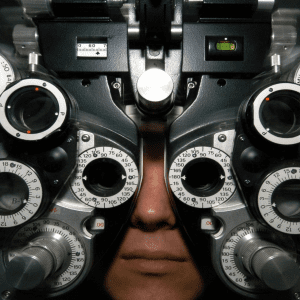All About Macular Degeneration

Eyesight is such an integral aspect of our everyday lives. Our eyes allow us to vividly capture and retain memories. More importantly, they allow us to navigate our way through the world. That’s why maintaining good eye health is vital.
One key to maintaining eye health is to take preventative steps that help stop or slow the development of serious disorders like macular degeneration.
What It Is
Macular degeneration is a condition that causes loss of the center portion of your vision.
It occurs when a part of your retina, called the macula, is damaged. Your side vision remains normal. Your center vision, however, will lose detail whether you are near or far from what you are viewing.
Macular degeneration will not generally lead to complete vision loss. But it can affect your vision to the point that you might lose the ability to read, distinctively recognize objects, drive, or the capacity to perform other vision-related activities. What’s more, you could eventually be declared legally blind.
Causes of Macular Degeneration
Some causes of macular degeneration are:
- • aging
- • high blood pressure
- • smoking
- • heredity
Fortunately, there are ways to reduce the risk of developing this eye disorder. Exercising, observing a healthy diet, not smoking, and getting regular eye exams can help your eyes remain healthy, and keep your vision safe.

Forms of Macular Degeneration
Macular degeneration is a complex disease that presents itself in one of two forms. There are treatment options, for both types, that can help slow the progression of the disease.
Form 1: Dry Macular Degeneration
Dry Macular Degeneration is the most common type and progresses more slowly toward vision loss. It occurs due to thinning of the macula, the small portion of your retina responsible for sensing light.
It can progress through an early, intermediate, or advanced stage. The early-stage may not cause any symptoms at all. On the other hand, intermediate stage symptoms are blurred and hazy vision. Those symptoms may eventually lead to total central vision loss in the advanced stage.
How to Treat Dry Macular Degeneration
There are no cures for dry macular degeneration. Still, supplements containing antioxidant vitamins, healthier eating habits, and lifestyle changes can slow or reduce the risk of the condition advancing to total vision loss.
Form 2: Wet Macular Degeneration
Wet Macular Degeneration can appear suddenly and progress rapidly. It occurs due to blood vessels leaking blood into your retina and causing damage to the macula.
Wet macular degeneration produces vision distortion and a notable blind spot in your field of vision. This form is much more severe than dry macular degeneration.
How to Treat Wet Macular Degeneration
Wet macular degeneration cannot be cured but can be treated by shrinking the eye’s blood vessels and limiting leaking into the retina. Laser treatments and medicated eye injections can also help slow the development of vision loss.
Your eyes can be just as vulnerable as your heart and lungs if adequate care, maintenance, and proper nutrition are not observed.
If you have noticed warning signs of vision loss or need to schedule a routine eye exam, please contact The Eye Center in Huntsville or Madison at 256-705-3937.
